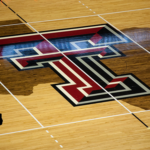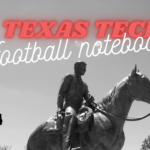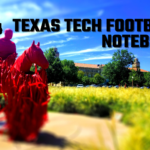First and foremost I’d like to hat-tip Land Grant Gauntlet and the DallasNews for compiling and gathering the information.
What we’re looking at here is the table for head coach, offensive coordinator and defensive coordinator for all of the Big 12 programs that are subject to having to report these things under a FOIA request. Baylor and TCU, being private institutions, are not subject to these sorts of requests.
| Head Coach | Offensive Coordinator | Defensive Coordinator | |
|---|---|---|---|
| Oklahoma | 6,000,000 | 500,000 | 905,000 |
| Texas | 5,100,000 | 650,000 | 800,000 |
| Oklahoma State | 3,700,000 | 400,000 | 550,000 |
| Texas Tech | 3,100,000 | 260,000 | 550,000 |
| West Virginia | 2,880,000 | 651,000 | |
| Iowa State | 1,900,000 | 350,000 | 384,375 |
| Kansas State | 1,710,000 | 400,000 | 400,000 |
| Kansas | 800,000 | 350,000 | 400,000 |
A couple of things stand out here
- West Virginia does not employ an offensive coordinator, at least not by title, which is actually pretty hilarious.
- Since we’re mostly concerned about Texas Tech, the defensive coordinator appears to be on par for what Texas Tech wants to do, but technically, Gibbs salary is tied for 4th in the conference and it’s clear that Oklahoma and Texas out-pace everyone, but West Virginia is paying $100,000 more than both Texas Tech and Oklahoma State.
- Paying coaches obscene amounts of money is not a guarantee that a team will get wins. See the Longhorns. But they seem to be the outlier. Most of these salaries and their rankings seem to line up with how teams finish in the conference. And they are poised to pay Sonny Cumbie $1 million to coordinate their offense. There are also rumors that Cumbie makes $700,000 as a co-offensive coordinator who doesn’t call plays at TCU. Money talks.
- There doesn’t appear to be much concern from my perspective on this end of things. The one thing that I’d like to do is compare these stats to the average SEC program. The SEC outruns (SEC speed) the Big 12 as the top coordinator is Will Muschamp, making $1.6 million, the top 10 coordinators are all in the SEC or the ACC (Brent Venables at Clemson and Bud Foster at Virginia Tech). Seven of the top ten coordinators are all in the SEC.
- There’s no doubt that the Big 12 made it to the final four this year, but the spending in the SEC is far and away the most lucrative for assistant coaches and there’s probably a reason why the SEC has been as good as they’ve been for so long or at least there’s the perception that they’ve been good. This doesn’t mean that all of these coaches are worth their salary (because it’s crazy to think how much they make) but the fact that Muschamp doubles Gibbs is a bit shocking.
- I know a lot of folks gripe about Eric Morris, but as you can see here, Morris is the lowest paid offensive coordinator, other than West Virginia where they don’t have a coordinator, in the Big 12. I know I’m probably alone on this deal, but I like Morris and there probably isn’t a huge number of offensive assistants that are willing to not call plays and still be titled an “offensive coordinator”. I think Morris’ salary is appropriate paid for what he does.
Via Land Grant Gauntlet, this is the support staff, which includes everyone, from the guys that wash the towels to the assistant coaches.
| School | Salary |
|---|---|
| Texas | 14,399,408 |
| Oklahoma | 12,373,433 |
| Oklahoma State | 7,780,550 |
| Texas Tech | 7,766,748 |
| West Virginia | 7,339,030 |
| Kansas State | 6,370,624 |
| Iowa State | 5,835,003 |
| Kansas | 5,113,790 |
*Offensive line, running backs, and tight ends coaching salaries were unavailable due to recent hires.
- I think this is where things get interesting, particularly since Oklahoma State didn’t have three position coaches even listed, so if you think that those folks might early $200,000 to $250,000 per position, that puts Oklahoma State closer to $8.4 million overall. Paying coaches more money doesn’t always equal success, but like a lot of things in life, those who make the most money are generally pretty good at their jobs. Not all of the time, but some of the time.
- Those that spend the fewest amount on coaches end up winning fewer games (Longhorn exception noted). It’s tough to account for TCU and Baylor, but I’d guess that they’re compensating their assistants as good as any of the top three programs.
- So where does that get Texas Tech? I think that Texas Tech was at a crossroads of where and what they want to be, at least before they let Mike Smith, Trey Haverty and Kevin Curtis go. But now, they have an opportunity, perhaps, to maybe pay some guys a marginal amount of money, and most likely be in the realm of marginal teams in the Big 12 or Texas Tech can make a splash and start poaching and hiring away coaches that have big-time coaching and recruiting resumes. Again, this doesn’t always mean success, but we’ve seen the parade of position coaches come through here for 7 years and there’s really only been a few that I come back to the idea that they have really earned their paycheck.
- Kingsbury’s contract stipulates that assistant coach salaries have to increase by 3% each year. That’s the minimum, but it rose by 6% last year when Gibbs was hired.
Like a lot of you, I’m somewhat at a loss for how to turn this thing around (this “thing” being the defense), but I do know that Texas Tech has been a program that’s paid assistant coaches, right about where I think they believe they should be finishing. And I would bet that the same thing could be said about the Tuberville reign of terror as well. However, I suppose the question is really if Texas Tech expects significant improvement without significantly increasing those salaries. I’m not advocating just opening up the wallet and paying anyone any amount of money, but with higher salaries you’re more likely to retain those coaches, create some consistency and make something. Maybe it also starts with giving David Gibbs an extension, something that sounds crazy considering how Texas Tech was abysmal on certain parts of the defense (yards allowed), but improved in other areas (turnovers).
Maybe changing coordinators is the new normal. I think it’s also important to note, like a lot of you have before, that if you want to play with the big boys, then you had better be ready to pay like the big boys. Kingsbury firing his friends was step one, now, step two is hiring some coaches that may cost more than you’ve spent previously.









